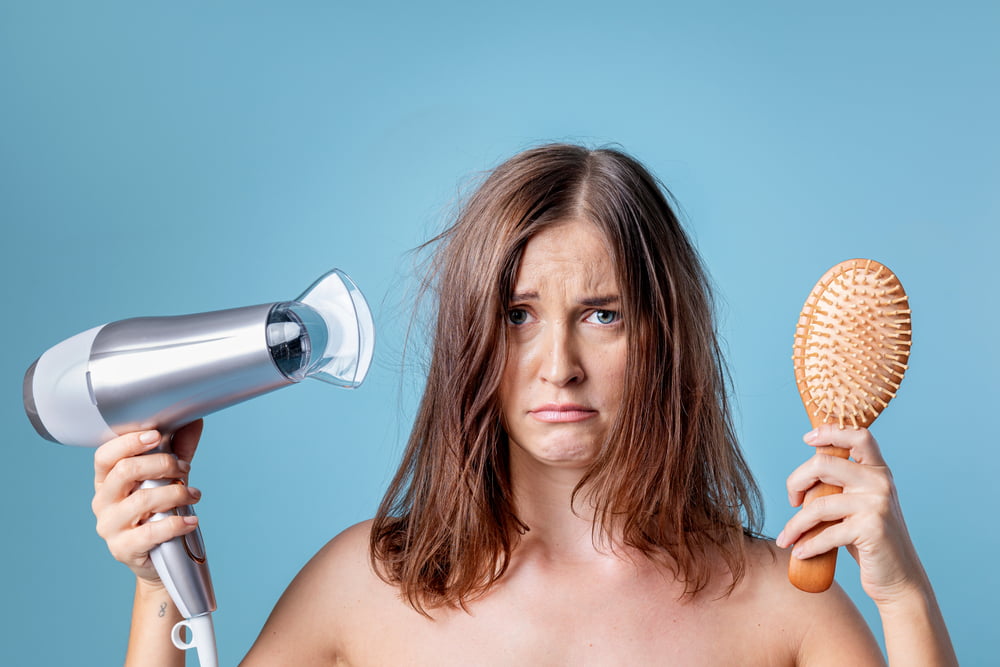Menopause frizzy hair treatment
Did you know that up to 80% of women face hair texture changes during menopause? This often leads to frizzy, hard-to-manage hair. It’s frustrating and can hit your confidence hard. But, there are treatments to help.
Whether your issue is dryness, frizziness, or even hair loss, solutions exist. You’ll find ways to handle your menopausal hair with confidence.
Key Takeaways:
- Menopause can change your hair, making it frizzy and hard to style.
- Figuring out why your hair is frizzy can lead to better treatment and care.
- Special hair care products and certain hairdos can make a big difference.
- Using shampoos without sulphates can cut down on dryness and frizz.
- Getting keratin treatments might be a good long-term plan to reduce frizz.
Understanding the Causes of Frizzy Hair in Menopause
Frizzy hair in menopause links to many things. These include how the natural scalp oil balance is disrupted. This imbalance results in both dryness and the frizz we see.
Hormonal changes are a big reason. During menopause, your body’s levels of estrogen and progesterone go down. This affects the oils that keep your hair moisturized. Your hair can become dry and prone to frizz because of this.
Getting more grey hair is also a factor. As we age, the natural hair colour fades, turning grey or white. Grey hair’s texture is often different from the rest, leading to an uneven, frizzy look.
Taking certain medicines in menopause can also change your hair. Some drugs for menopause symptoms can make your hair dry and frizzy. Conditions like pre-diabetes don’t help either. They can make the frizz situation worse.
It’s important to know what causes frizzy hair in menopause. This knowledge helps in choosing the right treatment. By understanding hormonal changes, grey hair, medicines, and health issues, you can fight frizz. You can make your hair healthy and vibrant again.
Effective Menopause Frizzy Hair Treatments and Remedies
Many women face thinning and frizzy hair during menopause. Luckily, there are plenty of treatments from top brands to help. They can make your hair look healthy and beautiful again.
Using Hair Care Products Specifically Formulated for Menopausal Hair
Using the right products is key to beat frizz and add moisture. Charles Worthingtons MenoPlex menopause range and Pantene’s Menopause Revitalize Collection. They repair damage, cut down on frizz, and make your hair strong and healthy.
Switching to Sulphate-Free Shampoos
Sulphate-free shampoos help a lot with frizz. They’re gentle and don’t dry out your hair. Pick ones that moisturise, to keep your hair soft and frizz-free.
Incorporating Deep Conditioning Treatments
Deep conditioners can transform your hair. They add a lot of moisture which reduces frizz. Use a conditioner for dry hair once or twice a week for the best effect.
Keratin Treatments for Longer-Term Results
Keratin treatments are good for long-lasting smoothness. They make your hair cuticles smoother, which cuts frizz. Remember, these treatments involve chemicals and may need a pro’s touch. Talk to a hairstylist at your local salon to see if it’s right for you.
Using these methods, you can make your hair smoother and easier to manage. Try different things to find what makes your hair look best. Enjoy your beautiful, healthy hair during menopause.
Conclusion
Dealing with frizzy hair in menopause can be tough. Yet, with care and the right treatments, you can make your hair look beautiful again. Use these tips to handle frizz well and keep your hair healthy.
Start by picking the right products for your hair now. Look for top menopause hair care brands like Pantene and Charles Worthington. These items add moisture and lessen frizz, making your hair smoother.
Think about changing up your lifestyle too. Go for shampoos without sulphates to stop your hair from drying out. Pick easy, gentle hairstyles and treat your hair with deep conditioners now and then. For a longer fix, you could try keratin treatments. These help make your hair cuticles smoother and less frizzy.
Using these hints and natural remedies can really help with frizzy menopause hair. You are not the only one facing this issue. With the right approach, you can love your hair and feel great about your style during menopause.


